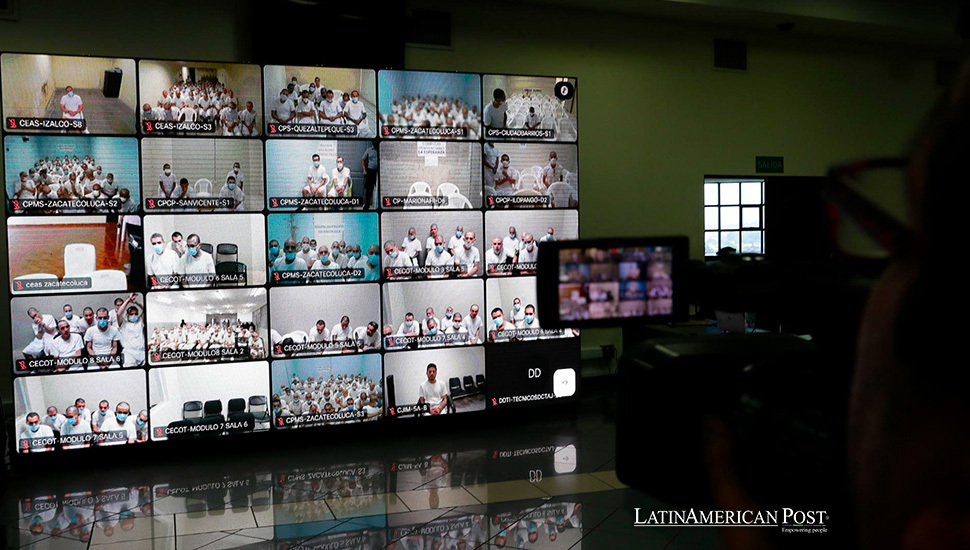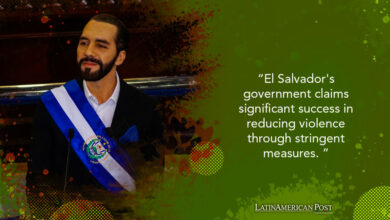El Salvador’s Historic Trial Against MS-13 as a Decade of Crimes is Scrutinized

El Salvador embarks on a landmark legal proceeding, prosecuting nearly 500 alleged Mara Salvatrucha (MS-13) leaders for over 37,000 crimes, signaling a monumental step in the nation’s fight against gang violence.
In an unprecedented move, El Salvador initiated a mass trial on Thursday, targeting nearly 500 individuals believed to be the architects behind the notorious Mara Salvatrucha (MS-13) gang’s reign of terror. This trial, encompassing over 37,000 crimes committed across a decade, represents a significant milestone in El Salvador’s enduring battle against organized crime. The accused, including 24 of MS-13’s most influential figures, some of whom are wanted by the United States for extradition, face charges ranging from aggravated homicide and kidnapping to arms trafficking.
El Salvador’s decision to prosecute these alleged gang leaders en masse underscores the government’s commitment to dismantling the criminal networks that have plagued the country for years. The prosecutor’s office has made it clear that it intends to hold these individuals accountable for the widespread suffering inflicted upon Salvadorans, emphasizing that every crime committed by gang members was at the behest of these ringleaders.
Virtual Trial Highlights Crackdown on Gang Activities
The trial, conducted virtually due to the logistical challenges of managing defendants scattered across various prisons, is a testament to the severity of the crackdown on gang activities under President Nayib Bukele’s administration. Bukele, whose policies have focused heavily on crime reduction, received overwhelming support in his recent re-election, indicating broad public approval of his tough-on-crime stance. This support comes despite international human rights organizations expressing concerns over potential rights violations, including the arrest of approximately 76,000 Salvadorans without due process since the inception of the country’s state of emergency in March 2022.
This mass trial is particularly significant in the context of El Salvador’s troubled history with gang violence. The MS-13 gang, along with its rival Barrio 18, has long been a source of fear and violence in the country. Originating in Los Angeles in the 1980s among Salvadoran immigrants, MS-13 quickly spread to El Salvador and other Central American nations as members were deported back to their home countries. Over the years, the gang’s influence expanded, leading to widespread criminal activities, including drug trafficking, extortion, and murder, contributing to El Salvador’s reputation as one of the world’s most dangerous countries outside of war zones.
The government’s current crackdown on MS-13 and its leaders represents a critical juncture in El Salvador’s efforts to restore peace and security. By targeting the gang’s leadership, authorities aim to cripple the organizational structure that enables widespread criminal activity. Security Minister Gustavo Villatoro’s announcement that the mass hearing would focus exclusively on these alleged gang leaders rather than lower-ranking members highlights the strategic approach being taken to dismantle the gang’s hierarchy.
Debate Over National Security and Human Rights
This trial also raises questions about the balance between ensuring national security and upholding human rights. The mass arrests and detentions under the state of emergency have sparked debate over the legality and morality of such measures. Critics argue that the broad sweep of arrests, often lacking in due process, risks undermining the rule of law and damaging the fabric of Salvadoran society. Conversely, supporters of Bukele’s policies argue that drastic measures are necessary to combat the extraordinary threat posed by gangs like MS-13.
The outcome of this trial could have far-reaching implications for El Salvador and the broader Central American region. A successful prosecution of MS-13’s leaders could significantly weaken the gang’s grip on the country, potentially leading to a decrease in violence and criminal activities. However, it also underscores the need for continued vigilance and comprehensive strategies that address the root causes of gang membership, such as poverty, inequality, and lack of educational and employment opportunities.
Also read: Nayib Bukele’s Landslide Victory is a New Era for El Salvador Amid Controversy
The world watches closely as El Salvador moves forward with this historic trial. The nation stands at a crossroads, grappling with the challenge of eradicating gang violence while safeguarding the principles of justice and human rights. The success of this endeavor will not only determine the future of MS-13’s presence in El Salvador but also serve as a benchmark for other countries facing similar struggles against organized crime. The path ahead is fraught with complexities, but the resolve demonstrated by the Salvadoran government may well mark the beginning of a new era for a country long tormented by gang warfare.





